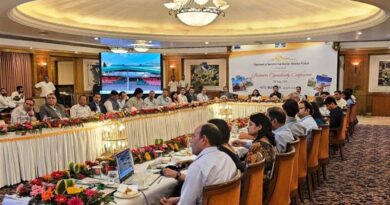Energy Security is a Global, Not Just National, Issue : Anurag
Anurag Singh Thakur Speaks in the United StaShri Anurag Singh Thakur, former Union Minister and Member of Parliament from the Hamirpur Lok Sabha constituency, presented India’s position at an event on the theme of ‘New Energy Equation’ organized by the US-India Strategic Partnership Forum in New York City, USA. He stated that the issue of energy security is not national but global, and synergy between energy, economy, and ecology is extremely essential. Shri Anurag Singh Thakur said that India’s stance on carbon emissions is very clear, and we have repeatedly urged developed and rich countries to completely reduce their carbon emissions by 2050.
Shri Anurag Singh Thakur said, “I believe that access to energy should be the right of every individual, not a privilege for a select few. The issue of energy security is not national but global, and synergy between energy, economy, and ecology is extremely essential. Under the leadership of our successful Prime Minister, Shri Narendra Modi ji, India has focused on capacity building and self-reliance. Self-reliance and resilience are the solutions to any obstacle and difficulty India faces. To power India’s clean energy future, we have launched the National Critical Minerals Mission. India is set to launch 1,200 exploration projects from 2024-25 to 2030-31, aiming to discover 30 critical minerals essential for economic growth, national security, solar energy, and more.”
Shri Anurag Singh Thakur said, “Just as climate change is a tragedy that everyone must face collectively, energy cooperation can also be a success story that everyone can share. I believe that this confluence of ideas, thoughts, and initiatives will play a significant role in building a global consensus on clean, green, and sustainable energy. New sectors are emerging every day, leading to an unprecedented increase in our energy demand. We are now in a data-driven society where data is powering our economy and every aspect of our lives. The data that powers our economy requires electricity to run. India’s data centers will become the second-largest electricity consumers by 2030. India will surpass even Japan and Australia in terms of electricity consumption by its data centers. Currently, Indian data centers consume 13 terawatt-hours, which will increase to 57 terawatt-hours by 2030. This means our data centers will consume 2.6 percent of India’s total electricity production. Our future energy requirements will increase significantly.”
Shri Anurag Singh Thakur said, “Our economic growth is necessary, but we also have to think about the Earth and our environment. There must be synergy between energy, economy, and ecology. This way, we can reduce carbon emissions and increase green energy. If we shift from conventional to non-conventional energy, it may be possible to ensure sustainable energy along with a clean and green planet. India has set a target of 500 GW of non-fossil fuel capacity by 2030, and we are taking every possible step to achieve this goal. Our total renewable energy capacity currently stands at 227 GW. India’s total installed power capacity reached 476 GW by June 2025. Over 50% of India’s installed energy capacity now comes from non-fossil fuel sources. Non-fossil fuel sources now contribute 235.7 GW to the total capacity, which includes 226.9 GW from renewable energy and 8.8 GW from nuclear power. India ranks fourth globally in renewable energy installed capacity. We are fourth in wind power. By July 2025, India’s solar energy capacity will have increased by 4,000%, and we have officially become the world’s third-largest solar energy producer, overtaking Japan. Over 2.8 crore households have been electrified, and per capita electricity consumption has increased by 45.8%. The energy deficit has decreased from 4.2% in 2013-14 to 0.1% in 2024-25.”


